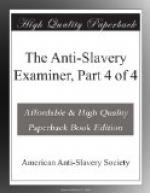only to provide for ourselves but also to relieve
the indigence of others; and permit us
in practice,
abstaining from every form of labor, to enrich and
aggrandize ourselves with the fruits of man-stealing?
Does he require us
in principle to regard “the
laborer as worthy of his hire”; and permit us
in practice to defraud him of his wages?
Does he require us
in principle to honor ALL
men; and permit us
in practice to treat multitudes
like cattle? Does he
in principle prohibit
“respect of persons;” and permit us
in
practice to place the feet of the rich upon the
necks of the poor? Does he
in principle
require us to sympathize with the bondman as another
self; and permit us
in practice to leave him
unpitied and unhelped in the hands of the oppressor?
In principle, “where the Spirit of the
Lord is, there is liberty;”
in practice,
is
slavery the fruit of the Spirit?
In principle,
Christianity is the law of liberty;
in practice,
it is the law of slavery? Bring practice in these
various respects into harmony with principle, and what
becomes of slavery? And if, where the divine
government is concerned, practice is the expression
of principle, and principle the standard and interpreter
of practice, such harmony cannot but be maintained
and must be asserted. In studying, therefore,
fragments of history and sketches of biography—in
disposing of references to institutions, usages, and
facts in the New Testament, this necessary harmony
between principle and practice in the government
of
God, should be continually present to the thoughts
of the interpreter. Principles assert what practice
must be. Whatever principle condemns, God condemns.
It belongs to those weeds of the dung-hill which, planted
by “an enemy,” his hand will assuredly
“root up.” It is most certain then,
that if slavery prevailed in the first ages of Christianity,
it could nowhere have prevailed under its influence
and with its sanction.
* * * *
*
The condition in which in its efforts to bless mankind,
the primitive church was placed, must have greatly
assisted the early Christians in understanding and
applying the principles of the gospel. Their
Master was born in great obscurity, lived in
the deepest poverty, and died the most ignominious
death. The place of his residence, his familiarity
with the outcasts of society, his welcoming assistance
and support from female hands, his casting his beloved
mother, when he hung upon the cross, upon the charity
of a disciple—such things evince the depth
of his poverty, and show to what derision and contempt
he must have been exposed. Could such an one,
“despised and rejected of men—a man
of sorrows and acquainted with grief,” play
the oppressor, or smile on those who made merchandize
of the poor!




